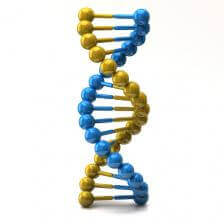Can Your Genes Make You Fat?
Is there such a thing as a fat gene or genetic obesity? Can you turn off your fat genes? Discover whether your genes can make you fat, and what you can do about it.
Ben Greenfield
Listen
Can Your Genes Make You Fat?

Have you ever wondered why some people seem to do very well on a diet and exercise plan, while others seem to fail when using the same plan? Much of this is due to the fact that everyone has a unique body type and body shape that will respond differently to a specific workout or nutrition plan. This is all spelled out in my book Get-Fit Guy’s Guide to Achieving Your Ideal Body.
But this week, a study hit the news that the way your genes express themselves (also known as epigenetics) can predict whether a specific diet or exercise regimen will work for your body. This is exciting because it means that at some point in the near future, a simple salivary test may be able to tell you what kind of fat loss or muscle gain program is going to work best for you.
So if all of this genetic fitness and diet customization is a reality, what about the opposite end of the spectrum? Can your genes make you fat? Is there such a thing as a fat gene or a genetic propensity for obesity? In this episode, you’re going to learn the truth about fat and genetics, and find out what you can do about it.
Is There a Fat Gene?
Studies for the past decade have demonstrably proven a link between genetics and propensity for overweight or obesity. For example, this report looked at a UCLA study in which researchers gave more than 100 genetic variations of mice a normal diet for 8 weeks, followed by a high-fat, high-sugar diet (aka, a “Standard American Diet”) for another 8 weeks.
Even though all the mice were eating the identical diet, their weight gain varied significantly. The calorie-laden diet caused absolutely no body fat change for some mice while other mice experienced a body fat increase of more than 600%!
The researchers were able to attribute this largely to genetics and they identified and compared 11 separate genetic regions that were associated with the fat gain in mice. You may argue that mice are not exactly the same as humans, but several of these genes directly overlapped with genes linked to obesity in humans.
One of the study authors said that he hopes this research will lead to new drugs and treatments that specifically target the fat genes. But a more important note on the study was the emphasis that no matter what the genes say, environmental factors such as diet and exercise are also extremely important when it comes to whether or not you’re going to store fat.
Can You Stop Your Fat Genes?
And that last note is exactly what is most important here. It was also elucidated quite clearly in another study, which found that physical activity can reduce your genetic tendency toward obesity by up to 40%! Another study found that those who carry a specific overweight gene called the FTO gene, but were very physically active, weighed the same as others who did not carry that overweight gene.
And the good news is that you can get the benefits of exercise without running marathons, doing triathlons, or spending all your time in the gym. In fact, being active for about 30 minutes a day can directly reduce the effects of “fat genes.” This means that you can defy your weight gain genetics by simply walking the dog, taking your bike to work, skipping the elevator and taking the stairs instead, or even taking cold showers.
But exercise isn’t the only way to reduce the effects of your fat genes. You can easily turn genes on and off with your lifestyle, your diet, and even your emotional state. As a matter of fact, you are changing your genetics or pulling specific genetic triggers daily, and even hourly, with the type of foods you eat, the quality of the air you breathe, the physical activity you do (or don’t do), and even by the amount of stress in your life. An entire field of study called epigenetics is devoted to this dynamic changing and on-off switching of genes.
For example, not getting enough nutrients from your diet, or cigarette smoking, or long term exposure to toxins and pollutants can affect not only your own gene expression, but also the health, propensity for disease, weight, and life of your children and even your grandchildren!
So the good news is that you can not only stop your own fat genes, but you can make the right decision for generations that come after you too! Need help getting started? Check out the episode What’s the Minimum Amount of Exercise You Can Do?, and for a routine customized to your own unique body type (which is based on your genetics) check out GetFitGuy.com.
If you have more questions about the role genetics plays in your weight, post them in the Comments section of head over to Facebook.com/GetFitGuy. See you there!
DNA image from Shutterstock

